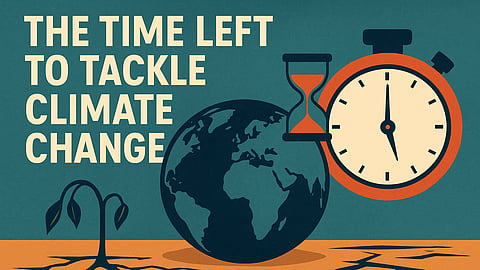Climate Action Psychology: Why “Time Left” Messaging Can Stimulate Action on Climate Change
Renowned for its vital role in global energy markets, the Middle East is now emerging as a pivotal force in the quest for sustainability. Governments and businesses across the Gulf are investing in renewables, crafting ambitious climate policies, and hosting global forums like COP28.
Yet, for transformative climate action to truly take hold across the region, and indeed the globe, we must confront a profound yet often overlooked barrier: human psychology.
The Challenge of Psychological Distance
International climate change reports, like the IPCC’s 2018 summary and the Paris Agreement of 2015, repeatedly underscore the need for urgent action. Yet, despite widespread awareness of climate events such as polar ice melts, forest fires, floods and water shortages, individual action is often lacking. Why do so many people care, but so few act?
One answer lies in the concept of psychological distance. Climate change is a "slow burn" crisis, unfolding over decades and manifesting in ways that are often intangible or distant. When threats are perceived as happening far away—whether geographically or temporally—they feel less relevant, less urgent. This “distance” can lead to disengagement, apathy, and inertia.
A few years ago, while browsing the BBC news website, I came across an article titled “How long are you going to live?” It featured the BBC’s life-expectancy calculator, which invited readers to enter basic information to estimate both their total life expectancy and the proportion of those years likely to be healthy. The headline alone was a compelling nudge; after all, who isn’t curious about their future? But what struck me most was how the information was framed: Would I rather know the number of years I have left, or the precise expiry date of my life?
This seemingly minor distinction in framing proved far from trivial. It led me, along with my research colleague Özlem Tetik, to examine how information framing impacts not just our curiosity but our motivation—especially when the stakes are as high as climate action.
We wanted to know: Could the way we present the timeline for climate threats—what psychologists call “temporal framing”—reduce psychological distance and motivate real action?
Two Approaches: Date Frame vs. Time-Left Frame
Our investigation included an archival analysis, eight online experiments, and a large-scale field experiment. The first step was simple: How do climate experts and media outlets typically communicate the timeline of environmental threats?
We found two dominant methods:
Date Frame: For example, “The UK will face water shortages by 2040.”
Time-Left Frame: For example, “The UK will face water shortages in 16 years.”
Our study revealed that 93% of headlines favoured the date frame. But which approach actually moves people to act?
Our subsequent experiments—including a field study with over 20,000 online readers—offered a clear answer. When presented with “time-left” headlines (e.g., “drought projected to occur within seven years”) instead of “date” headlines (“drought by 2030”), readers were 25% more likely to click through and engage. Not only did they pay more attention, but they were also more likely to donate to environmental causes when risks were framed in terms of time left rather than a distant date.
Why? Because time-left framing instils a sense that time is counting down. The threat becomes immediate and visceral, not an abstract point on a future calendar, but a countdown with high stakes.
From Research to Real-World Action
These findings carry powerful implications for governments, NGOs, and the media, especially here in the Middle East where water scarcity, rising temperatures, and ecological threats are no longer theoretical.
By reframing climate messaging in terms of “time left,” communicators can make environmental threats feel closer, reduce psychological distance, and spark a greater sense of urgency. Consider the difference:
Date Frame: “The region will face extreme water scarcity by 2040.”
Time-Left Frame: “The region will face extreme water scarcity in just 15 years.”
That subtle shift motivates action—whether donating to conservation, supporting new policies, or making personal changes. Urgency, not apathy, can become the norm.
Broad Applicability: Beyond Climate
Our research also suggests that time-left framing works across domains. In health communication, “You have two years to quit smoking before the damage becomes irreversible” is more compelling than “Irreversible damage will occur by 2027.” In financial planning, you can stress the importance of timely actions to avoid negative monetary consequences, for example “A budget crisis looms in three years if sales targets aren’t met”. Similarly, in the context of public policy, time-left frames can emphasise the need for swift legislative action, such as “We need to enact new regulations within five years to avoid penalties”.
For marketers, and especially those championing sustainable products and services, using time-left messaging can highlight the immediacy and relevance of their offerings.
A Call to Action for the Middle East
Climate action in the Middle East will not come solely from policy or technology; it must be rooted in the psychology of everyday decisions. By understanding how people think, feel, and act, we can design interventions that motivate sustainable choices at scale.
The psychological impact of framing isn’t abstract theory, it’s an actionable strategy with the potential to galvanize communities, policymakers, and businesses alike. By bridging psychological distance and activating a countdown mentality, we can transform concern into commitment, and commitment into action.
The region’s leaders have shown they can set ambitious targets. Now is the time to unleash the full power of behavioural science to ensure those targets become reality. It’s time to shift not just what we say about climate threats, but how we say it. The clock is ticking. Every year counts. Every action counts. The time left is less than you think—and more precious than ever.
David Faro is Associate Professor of Marketing at London Business School. His research examines consumer and managerial decision making. He is particularly interested in how to help consumers make better financial and health decisions. He also does research on the psychology of time perception and prosocial behaviour.


